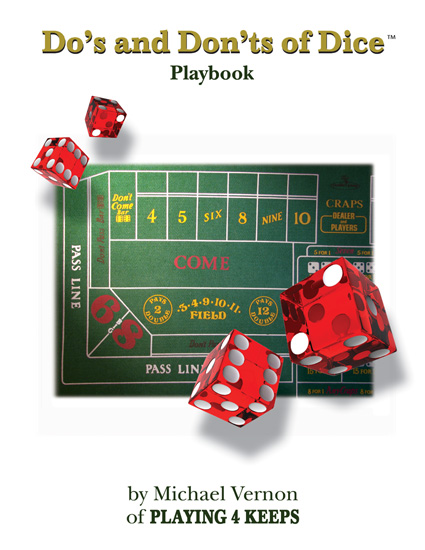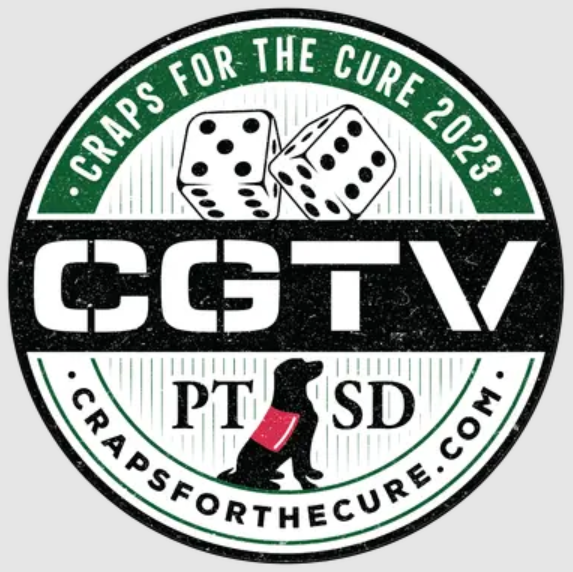|
Playing Craps: Investing in the Dice Wisely
BY: David Medansky
A dollar won is twice as sweet as a dollar earned."
- - Paul Newman, The Color of Money
Ever asked yourself what is the difference between playing craps and investing? If not, you should. There is very little difference between the two. Some investments have a high risk factor with a greater rate of return, while other investments have a lower risk factor and a lower rate of return. Similarly, some craps bets have a higher risk factor with a greater win pay-off, while other craps bets have a lower risk factor with a lower win pay-off.
There are many similarities between various types of investments and playing craps. For example, investing in commodities futures or options is extremely risky compared to investing in certificates of deposits. The commodities futures or options will, of course, allow you to make more profit. However, there is a greater chance you can lose a substantial amount of money investing in commodities futures or options. Investing in a certificate of deposit will provide you with a smaller profit, but you have little, if any, risk of losing your money. In craps, placing a bet on the "2" or "12" will allow you to win more (30 to 1), but there is a considerable likelihood you will lose your bet - greater than 97% probability of losing. Placing a bet on the "6" or "8" you will win a smaller amount of money (7 to 6), but there is less likelihood you will lose your bet - less than 17% of losing.
Webster's New World Dictionary, Compact School & Office Edition, defines "Invest" as "to put (money) into business, bonds, etc. in order to get a profit." Webster's Dictionary defines "Gamble" as "1. To play games of chance for money, etc. 2. To take a risk for an advantageous position." By comparing the definitions of "invest" and "gamble," one can ascertain that if you invest, you are putting money into stocks (business) or bonds or bank certificates of deposit in order to make a profit. If you "gamble" (play craps), you are putting money (a wager) on a portion of the Craps table layout in order to win money. Depending upon how you invest and how you bet playing craps determines if you will have greater chance of making or losing your money.
With most investments, if you want to earn more money, you need to make larger investments or take more risk. Playing craps is no different. If you want to earn more money playing craps, you need to make larger bets with less probability of losing and not necessarily play longer. For example, let's assume investor "Able" purchased 100 shares of XYZ Corporation for $10/share; investor "Baker" purchased 1,000 shares of XYZ Corporation for $10/share and investor "Charlie" purchased 10,000 shares of XYZ Corp for $10/share, all on the same day. If the next day or so XYZ Corp stock prices increases by $1 to $11/share, investor "Able" will make $100, investor "Baker" will make $1,000 and investor "Charlie" will make $10,000. The difference is investor "Charlie" risked more money to earn more than investors "Able" and "Baker." Similarly, player "Alpha" betting $5, player "Beta" betting $25 and player "Omega" betting $100 on the same bets will win or lose proportionately the same percentage. The difference is that "Omega" will win more money because he is risking more.
As the old saying goes, "It's not what you make, but what you keep." Professional investors and money managers always have a plan for implementing their investment strategies. Professionals set realistic rates of return (profits) for their investments before they make the investment. They know when to "take money off the table." The professionals also limit losses with stop loss orders or know specific points at which to exit an investment if it does not perform as expected. Similarly, professional gamblers always have a plan for implementing their gaming strategies. In order to invest in the dice wisely, you must set a goal for a realistic rate of return (how much you want to win) before you bet. Once you reach your goal, you must walk away from the table with your profits. To do otherwise is to get greedy. Being greedy will cause you to lose money.
How many people do you know who made a lot of money in the stock market in the late 90's only to see their portfolios drop dramatically. People lost money because they refused to take profits once they were made. To my knowledge, no one ever went broke taking a profit. Likewise, no one ever lost money walking away from a craps table with their winnings, no matter how small. You must also know specifically when to stop if you are losing money during a session and the betting strategy is not working (performing) as expected.
To illustrate my point about the importance of goal setting, I want to tell you about a friend of mine, who we will call Zeke. In January 2001, Zeke accompanied me on a trip to Las Vegas. Zeke set a goal to win $400. Zeke played his betting strategy instead of mine because he wanted to win more money in a short period of time. Had Zeke bet my strategy, his goal should have been to win approximately $200. Zeke lost $350 in 45 minutes while I won $660. Keep in mind Zeke and I were betting on the same shooters at the same table. One of the differences between how Zeke was betting and what I was doing, was I was taking my winnings down after one or two rolls of the dice while Zeke was leaving his bets up longer.
Determined to recoup his losses, Zeke went to the Blackjack table and promptly lost another $550 in approximately 20 minutes. Still determined to "win back" his losses, Zeke played Roulette. Zeke lost another $600 in about 15 minutes. Zeke lost a total of $1,500 in an hour and 20 minutes.
Zeke did NOT set an exit point to stop betting if he was losing money. Zeke did not set a "realistic goal" to win. Had Zeke done so and followed my betting strategy, Zeke would have won $280 playing craps instead of losing $350.
So what does it take to be able to invest in the dice wisely?
1. Discipline.
2. A plan of action.
3. Setting realistic goals for winning per session.
4. A large enough bankroll to support amount of bets being made.
5. A pre-determined exit point if you have a losing session (limit losses).
6. Knowledge of the game of craps. Understand the bets you intend to make before you make the bet. Know the risk in making the bet before you make it.
If you apply investment techniques to playing craps, you should be able to minimize your losses while maximizing your profits (wins). It is important to remember, just as there is no full proof strategy to investing, there is no full proof strategy to playing craps.
On a final note, ironically the knowledgeable craps player may have a greater sense of control over his "investment" since he knows exactly what the odds are against him. How many people can say that about their stock portfolios given the recent stock (Enron, WorldCom & Arthur Anderson) and mutual fund scandals?
By: David Medansky, author of CRAPS: A WINNING STRATEG
Click Here to return to the list of prior articles ...
|
 |










